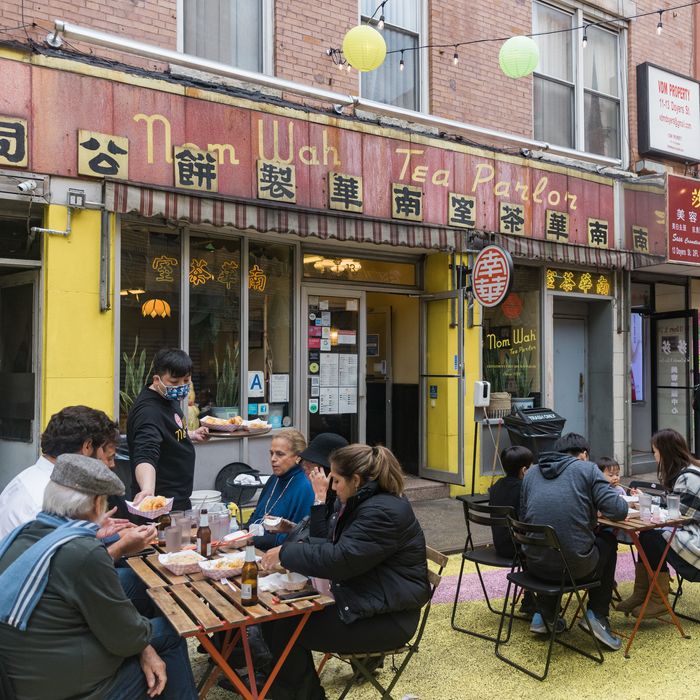
Nom Wah Tea Parlor has been a Doyers St. institution for a century. Photo: Jeenah Moon/The Washington Post/Getty Images
The behind-the-scenes battle at Chinatown’s oldest restaurant looked, for a while, as though it might have settled down. But a new lawsuit makes it clear that this fight is far from over. Three years ago, the Doyers Street dim sum parlor Nom Wah became embroiled in a lawsuit filed by feuding cousins, Vincent and Wilson Tang. In the end, the two split the empire — Vincent would run the original restaurant; Wilson, its newer offshoots — while sharing control of the company, its intellectual rights, and, crucially, a bank account. The animosity between the partners seems not to have faded in that time. Last month, Wilson filed a new lawsuit against Vincent alleging that he has engaged in “malicious and outright illegal conduct which threatens the future of the Company.”
Among other charges, Wilson contends that Vincent withdrew over $90,000 from a company account without consent, revoked access to a company bank account, refused to distribute funds for company expenses, and helped produce a documentary film that erased Wilson from Nom Wah’s story. Wilson is seeking a minimum of $200,000 for the breaches of contract allegedly committed by Vincent as well as the removal of Vincent from the company. In response, Vincent’s lawyer argues that the lawsuit is “frivolous” and motivated only by Wilson’s “spitefulness.”
“I’m just trying to do what’s right for the business. I’m kind of done with the existing situation,” Wilson says. He alleges Vincent is “not guided accurately and he’s making these poor judgment calls, and it just further proves to me that we can’t honestly work together.”
For his part, Vincent lamented that the ongoing disagreement had once again spilled out into the public. “This stuff should be kept private,” he says.
Nom Wah is 125 years old, a landmark in the heart of Chinatown — but by 2010, its reputation was suffering. That was the year Wilson took over the restaurant, after Fred Tang (Wilson’s uncle and Vincent’s father) bought the building from a friend, Wally Tang, on the condition that he keep the restaurant open. Wilson brought the restaurant back to life, bringing in both crowds and attention, turning the spot into a successful tourist destination.
Vincent joined the restaurant in 2015, and tension steadily rose in the ensuing years. Things came to a head in 2022: Vincent allegedly locked Wilson out of the restaurant and made it so he couldn’t access the company’s bank account. That July, Vincent filed a legal complaint accusing Wilson of taking “approximately $490,000” from Nom Wah, including expensing personal items such as a Porsche and paying himself and his wife exorbitant salaries. Wilson’s lawyers called it an “illegal scheme to take over the company and the restaurant.”
The lawsuit was settled the following year, and the current management arrangement was put into place. Among other stipulations, the cousins agreed to needing written consent for any withdrawal, transfer, or payment over $1,000. Violations of the term sheet carry a minimum-$50,000 penalty, payable to the other partner if not resolved within ten days.
This latest conflict began to take shape in late 2024 when Wilson was sent a link to a documentary about Nom Wah that Vincent had produced. In the version Wilson saw, Vincent allegedly claimed to have inherited the restaurant from Wally Tang, while Wilson’s role is scrubbed from the story. In a cease-and-desist letter sent to Vincent and the filmmaker, Wilson’s legal counsel, Vivian Chen, described the documentary as constituting “actionable defamation, impersonation, identity theft,” and more. (In February, an edited version of the documentary was uploaded to YouTube; Wilson’s involvement in the restaurant still isn’t mentioned.)
More friction arrived this fall: According to the lawsuit, in September, an administrator for Nom Wah who serves as an intermediary between the cousins, Barbara Leung, emailed Vincent to remind him about a $8,532.74 invoice filed by Wilson to cover an annual donation to a charity event called Lemon Ball, a Pearl River Mart gallery opening in May, an AAPI reception for Governor Hochul, and a Central Park Conservancy summer event, among other expenses. When Leung emailed Vincent about the invoice again on September 25, he allegedly refused to distribute the funds, saying that the events and donations were not previously approved. Four days later, Vincent allegedly withdrew $90,785.94 for — according to Wilson’s lawsuit — no “purpose other than [his] own self interest,” in violation of the terms agreed to as part of the settlement. The legal complaint calls this “seemingly as an act of defiance and with no proper justification” in retaliation for the repeated requests to reimburse Wilson’s invoices.
On October 29, Vincent’s lawyer filed an answer countering the allegations made in Wilson’s suit. Their side alleges Wilson’s $8,532.74 was for donations and events that promoted his Nom Wah restaurants and not the company, or the original Chinatown location, overall. They contend that Vincent withdrew the money to protect his interests. They allege in the complaint that this most recent legal action amounts to sour grapes: “Wilson Tang and his attorney cannot accept the fact that Vincent Tang has acquired the operation of the original Nom Wah.” The complaint continues that because of this, Vincent “has been harassed on a continuous basis” by Chen “with threats of damages, costs, and frivolous complaints for the sole purpose of satisfying her client’s spitefulness.”
So far, the court does not seem to agree with Vincent’s lawyer. Last week, a judge granted Wilson’s request for a preliminary injunction. Vincent was ordered to deposit $90,785.94 back into the company’s bank account, to make Wilson an authorized representative on the company’s bank account, and to reactivate said account. Both Vincent and Wilson say it’s their responsibility to keep the restaurant going. In a statement provided by his lawyer, Wilson says he will fight “to ensure Nom Wah remains intact for generations to come.”
For his part, Vincent points out that, as the settlement agreement stipulates, he’s the one running the original location, “but unfortunately, these things have been holding me back a little bit.”











